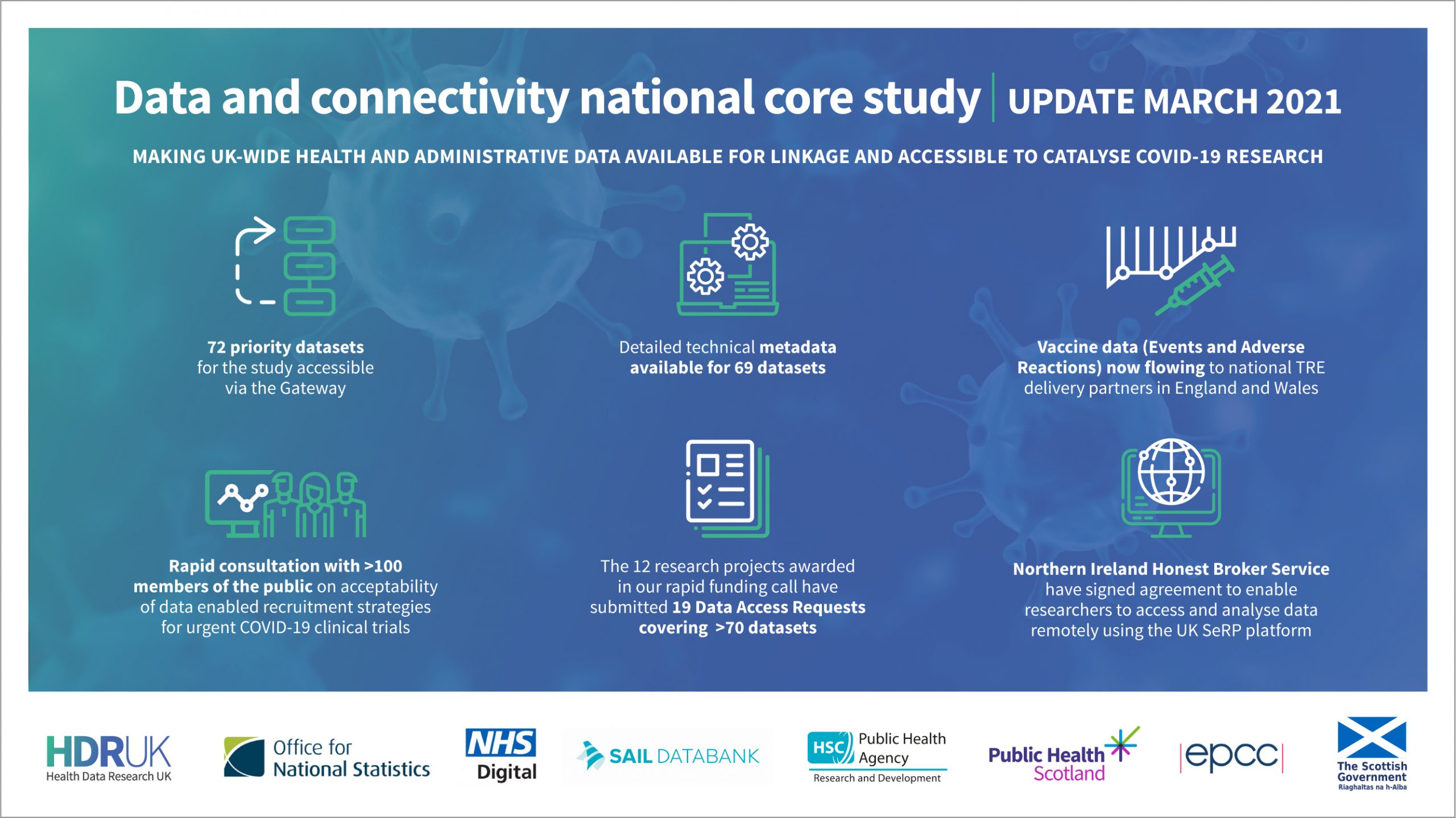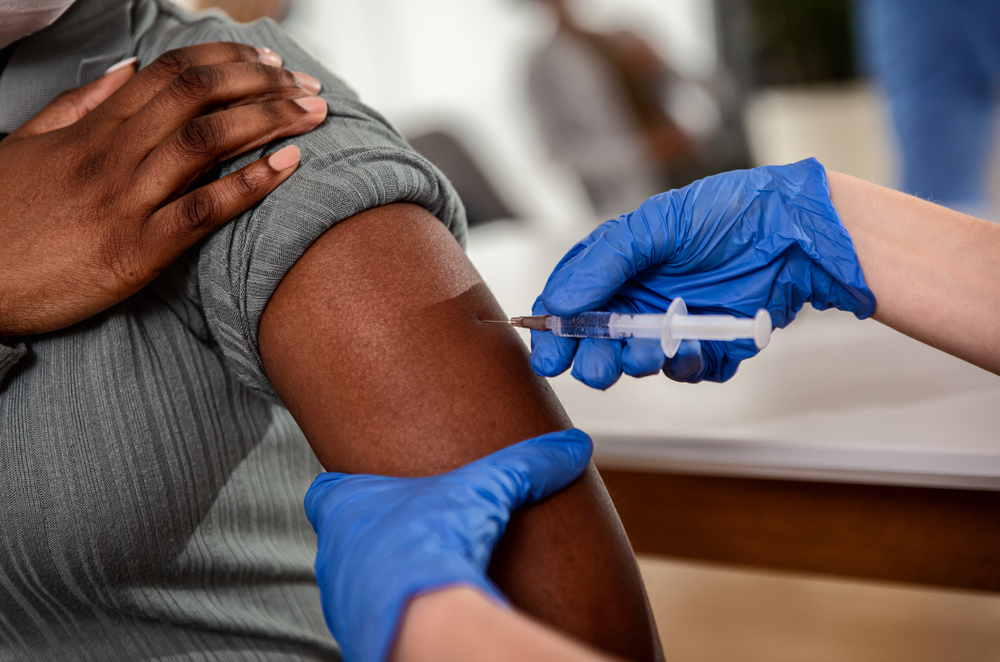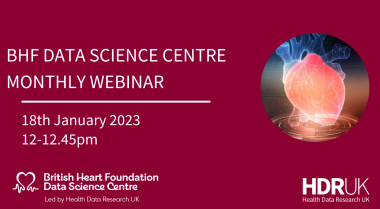COVID-19 Research Round up – 16 March 2021
16 March 2021
At HDR UK we are continuing to work in partnership to support the UK government and the NHS in England, Northern Ireland, Scotland and Wales to enable rapid health data research into COVID-19.
The highlights for this update include:
- INSIGHTS in our latest report to SAGE
- PROGRESS on National Core Studies in this week’s Data and Connectivity progress report.
- READ impact of patient and public involvement in the Data and Connectivity programme.
- DISCOVER COVID-19 data and tools on the Health Data Research Innovation Gateway.
INSIGHTS: Our latest report to SAGE
This week we published the latest research insights and data access updates in our regular report that we share with SAGE(the Government’s Scientific Advisory Group for Emergencies), UK Research and Innovation and the wider science community.
The highlights for this report include the following research, all of which demonstrate the benefits and insights that can be gained from using linked health data at scale:
Primary care and hospital records from over 17 million people found that there was a reduction of heart attacks, strokes and blood clots on the lungs during the first wave (comparing April 2020 to April 2019) in the general population. However, these were highly likely to occur in people with COVID-19.
A new resource linking health data for over 54 million people from GP records, hospital data, death records, and COVID-19 lab tests and data on medications dispensed from pharmacies, is now accessible in the NHS Digital Trusted Resource Environment.
The Pfizer-BioNTech and Oxford-AstraZeneca vaccines both significantly reduce severe COVID-19 in older adults; new analyses of Public Health England Data found through linking testing, vaccination and hospitalisation data.
Results from Public Health England’s SIREN study in healthcare workers indicate that the Pfizer-BioNTech vaccine prevents both symptomatic and asymptomatic COVID-19 infection, including the UK variant. This is especially important given that reducing transmission in hospitals and care homes will help to protect vulnerable people.
An observational study using historic and recent NHS hospital episode data from 12.5 million patients have found that surgical procedures have reduced by 33.6% in England and Wales during the pandemic.
This week’s patient and public voice feedback:
As the UK begins to move out of a national lockdown, and more of the population being vaccinated, there remain a number of key research questions around vaccine effectiveness and its impact on hospital admissions. These include understanding factors influencing vaccine uptake, evaluating the success of interventions to overcome “vaccine hesitancy” and whether vaccines should be prioritised according to occupation.
Additionally, whilst research has shown a complex relationship between COVID-19 and certain clinical events such as heart attacks and strokes; additional investigation is needed to determine whether there are links with other as yet unexplored clinical events (not previously explored), whether the virus affects certain populations more than others, and if so, the reasons behind it.
PROGRESS: National Core Studies – Data and Connectivity Progress Report

Health Data Research UK and the Office for National Statistics are continuing to work in partnership to lead the Data and Connectivity Study. This month’s report details the key progress and achievements made by the delivery partners across the UK and the key datasets that are now available for vital COVID-19 research. Progress this month includes:
- Working in partnership with AstraZeneca to conduct rapid PPIE consultation on acceptability of data enabled recruitment strategies for urgent COVID-19 clinical trials. A consultation has been conducted with >105 members of the public, and directly shaped and informed the trial recruitment strategies for TACKLE and STORMCHASER trials
- The 12 research projects awarded in our rapid funding call enable research which uses and enriches the data within the Data and Connectivity National Core Studies; all listed on the HDRUK Innovation Gateway. Lay members reviewed lay summaries for each of the 12 projects now published on the HDRUK website .
- The HDR UK convened Vaccine Data Infrastructure Group (chaired by Professor Sir Munir Pirmohamed) continues to map vaccine data flows and linkages required for research, identify key research questions and enable data access.
- The need for a rapid feed of hospital admissions data to support the roll out of the COVID-19 Vaccination programme was identified. A rapid funding call was launched to invite applications from teams to run a feasibility study to establish a data flow giving researchers rapid access to hospital admissions data. An additional “task and finish” group was also set up in this Sprint to compare and align the definitions and analytical methods being used for COVID-19 vaccine research.
READ: Impact of patient and public involvement in the Data and Connectivity programme
Judy Slape, Public Engagement and Involvement Officer on the Data and Connectivity programme writes about how HDR UK is embedding patient and public involvement and engagement throughout the programme to ensure that our work is transparent and accessible to the public.
DISCOVER: COVID-19 data on the Health Data Research Innovation Gateway
Since launching a “Minimum Viable Product” in June 2020, the Innovation Gateway has developed enormously, supporting the discovery and access of datasets for health research.
The platform has particularly supported the UK government’s “National Core Studies” into COVID-19, increasing our understanding of the virus and how we respond to it most effectively.
There are now over 600 datasets listed and available to request access through this platform. These include 6 dedicated collections (54 datasets) for the National Core Studies into COVID-19, openly available to discover and request access.
Recently added datasets include the COVID-19 vaccination datasets for England and Wales; with more linked vaccination datasets to follow in coming weeks, to support this crucial aspect of research.



